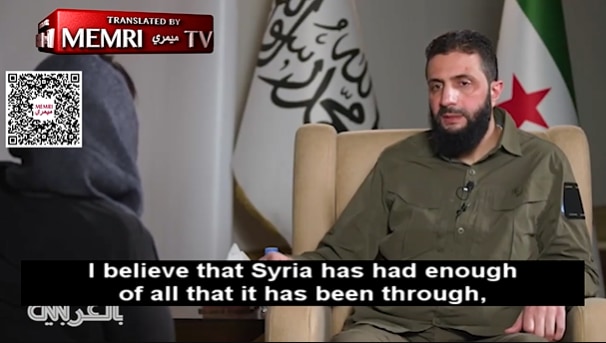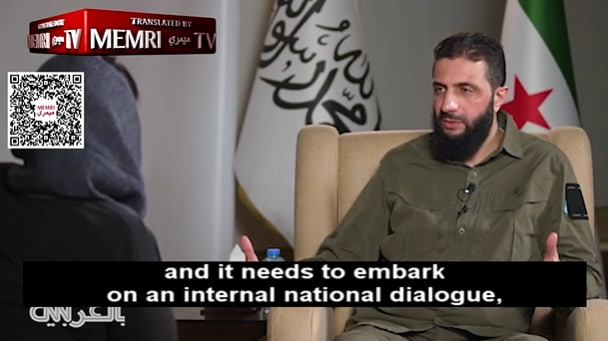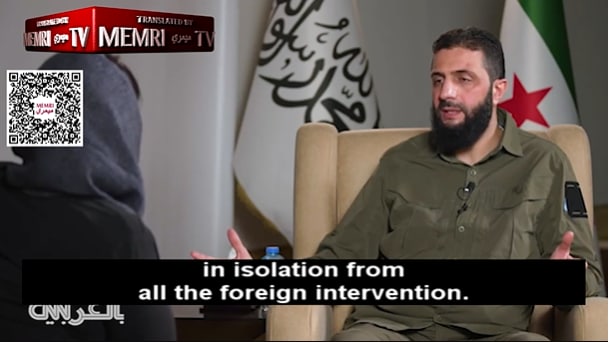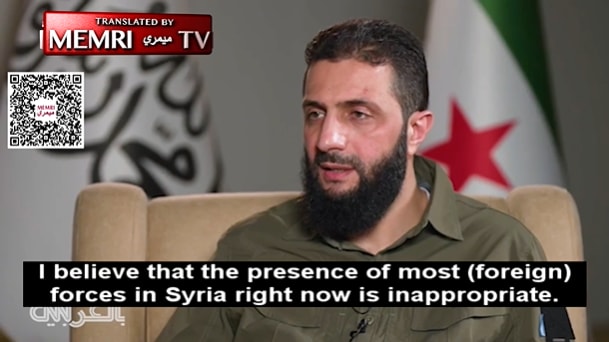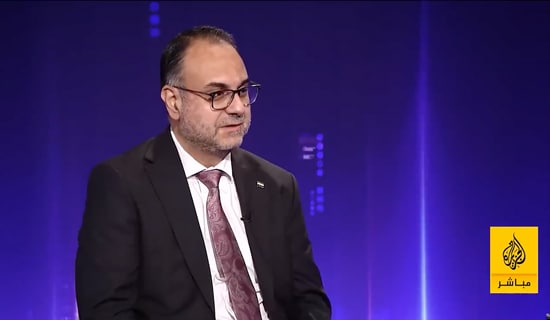
In an interview with CNN Arabic on December 6, 2024, on the eve of his group, Hay'at Tahrir al-Sham (HTS), fully taking control of Syria and ousting former President Bashar al-Assad, HTS leader Ahmed Hussein al-Shar'a, known by his nom de guerre Abu Mohammad al-Joulani, outlined his views on the Syrian regime, the future of Syria, and his vision for governance.
Al-Joulani emphasized that the ultimate goal of the revolution was to overthrow the regime, stating, "This regime is dead." He expressed hopes for a quick resolution to the war, so Syria could focus on rebuilding and regaining its pioneering role. He stressed the importance of institution-building and tried to dispel fears that minorities like Christians and Druze would be harmed under the new regime, stating that under HTS rule in Idlib and recently in Aleppo, Christians were protected.
Addressing concerns about Islamic rule, Al-Joulani argued that fears arose from misinterpretations or previous abuses. He clarified that HTS would not be autocratic but instead would create a system governed by laws chosen by the people, through bodies like an advisory and shura council.
Al-Joulani also distanced himself from his former ties to al-Qaeda and ISIS, asserting that his stance against harming civilians was what ultimately led to his break from ISIS. He rejected the designation of HTS as a terrorist organization, calling it politically motivated. Al-Joulani concluded by asserting that Syria must engage in a national dialogue, free from foreign influence.
Abu Mohammad Al-Joulani: "The [Syrian] regime has failed to establish a state in the full sense of the word, with an organized army, strong economy, human resources, and so on. This regime consists of a family that occupied this country. All the country's resources have been harnessed to serve this family. The army was not built in a patriotic way, with the motivation of defending this country. Most of the people in this army were forced to enlist. Most of the people in Syria do not believe in this army, because it has been used to humiliate them. Corruption has gnawed at the heart of this regime and all its institutions, and this is why even though Syria has ample economic resources, it is always poor.
[...]
"The Iranians tried for a while to revive this regime, and then the Russians had a shot at reviving it, but the reality remains unchanged – this regime is dead. All the attempts to resuscitate this regime have failed.
[...]
"The goal of the revolution is the overthrow the regime. It is our right to use the means at our disposal in order to accomplish the goal of ousting this regime. We hope that this war, or this military confrontation, ends as soon as possible, so that people can move on to building and development. We want Syria to regain its pioneering role in the world, and become a model for building, rather than exporting crises that threaten the neighboring and other countries, like the regime is now doing, by aligning itself with the Iranian enterprise to occupy the Arab countries.

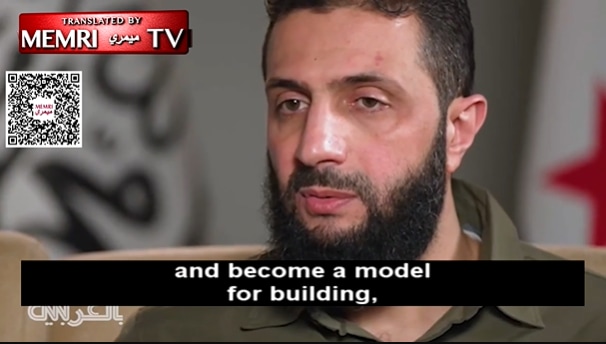
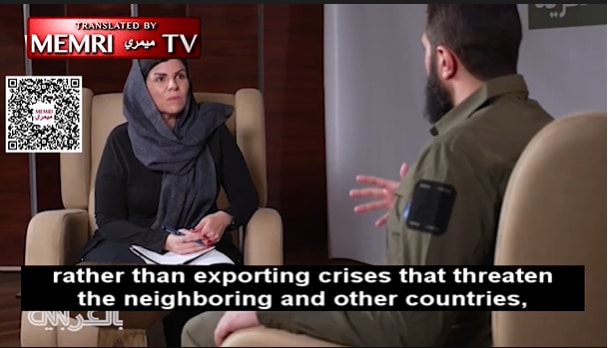
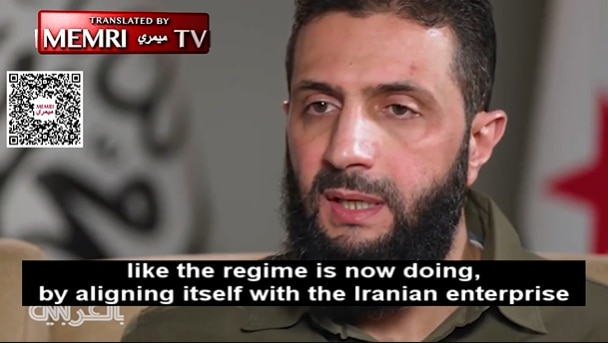
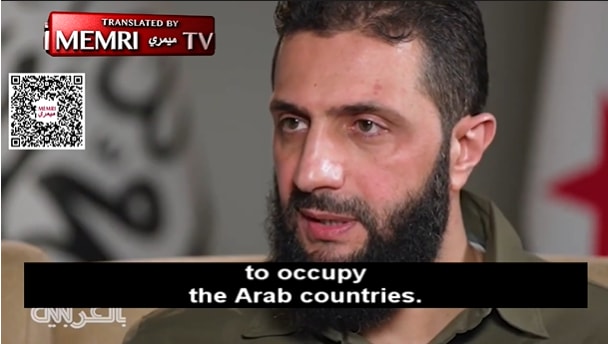
[...]
"Some Arab countries have been trying to isolate the regime from the Iranian enterprise. I think that such a thing is impossible. Even if the regime agrees to this, it cannot implement it, because the regime's relations with Iran have become organic. Iran can disengage from the regime, but the regime cannot disengage from Iran.
[...]
"People who fear the Islamic rule have either seen cases where Islamic rule was implemented in a wrong way, or they do not understand it properly. We are talking about something that is in line with the customs of the region. The most important thing is to build institutions. This is not my decision. There [will be] an advisory council and a shura council elected by the people. The people will agree on a law for the country, in the form of a constitution and regulations. Then these regulations will be passed over to the executive agencies, like the government, the ministries, and the institutions, and the Shura Council will oversee this... This is an integrative process. We are not talking about an autocracy, where individuals rule according to their whims.
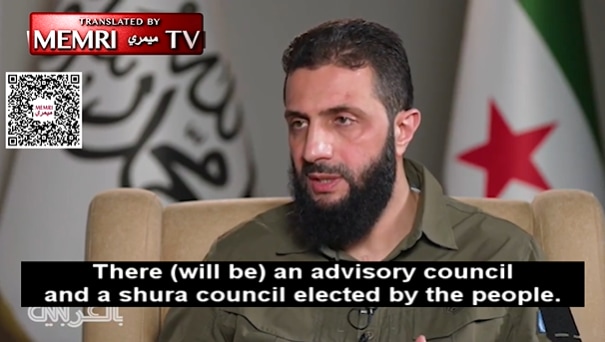
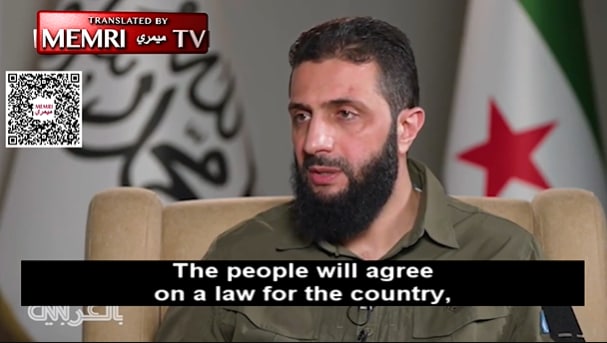
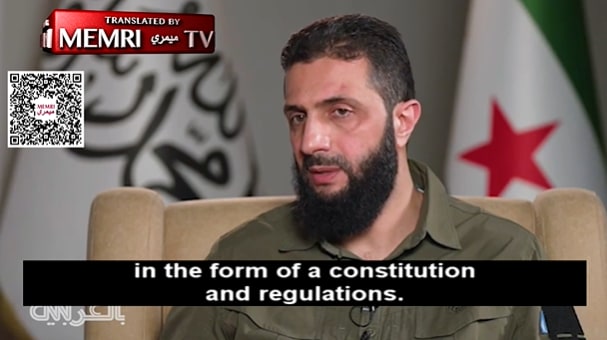
[...]
"In Idlib, there are minorities like Christians and Druze, and they have been safe, thank God. There were some attacks against them by individuals when there was anarchy, and we did right by them and restored their property to them. That was in Idlib. In Aleppo, when we went in, not a single Christian left the city. They were safe in their places, their churches, and their homes. They were left intact, and nothing happened to them. The law will protect us, them, and their rights. The important thing is to move on to be governed by law that will protect everybody's rights."
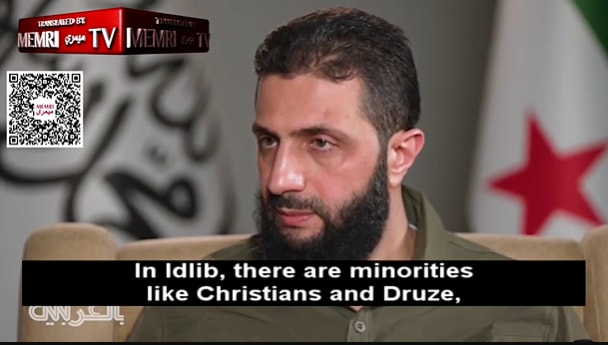
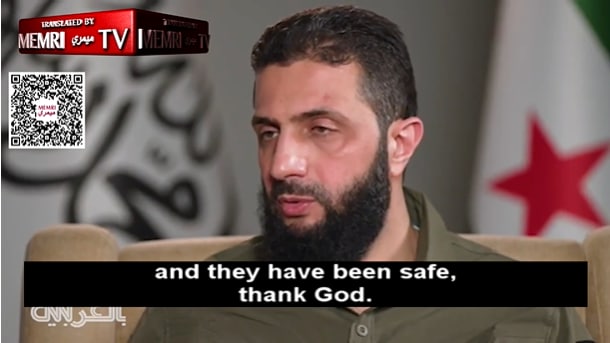
Interviewer: "People know you as a former leader in Al-Qaeda, and know about your ties with Al-Qaeda and the Islamic State. What is HTS? How would you describe it now?"
Al-Joulani: "HTS is one of the factions in the region. It is like all the other factions. We are now talking about a great enterprise, about the building of Syria. HTS is just a small detail. It may be disbanded at any moment. It is not the goal. It has been a means to carry out a mission against this regime. If its mission is over, it will be integrated into the institutions."
[...]
Interviewer: "Are the [Al-Qaeda] days over for you?"
Al-Joulani: "It has been a process, with each phase dependent on the time and place. The circumstances require one to use a certain discourse. When you are in circumstances of war and hatred, you use certain discourse, and when there is peace, you use a different discourse.
[...]
"There is nothing wrong with a person developing, using versatile discourse, and sometimes, trying to adjust to the circumstances. When a person is rigid in his ideas and guidelines, he cannot lead a society or manage conflicts like the ones we have in Syria.
[...]
"Our designation [as a terrorist organization] is political, first and foremost, and at the same time, it is a mistaken designation. Many things happen in the world, and even if people agree on them, they are not necessarily correct. What is the definition of terrorism? It has become a weapon to fight political rivals in every country. Every island country anywhere in the world has a terrorism list. You don't need to be a superpower to have one. It has become in vogue. Each country has a terror list, which it uses to fight its political rivals. I say that a person who kills innocent civilians and deliberately harms and displaces people – this description is more suitable to many of the wars waged by the superpowers in Arab and Islamic countries, as well as elsewhere. They killed thousands of people deliberately, bombed many houses, and caused destruction and displacement."
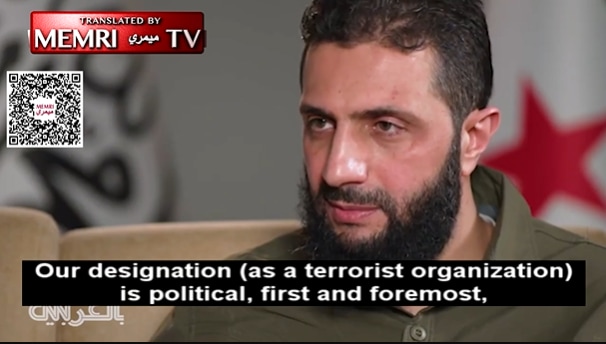
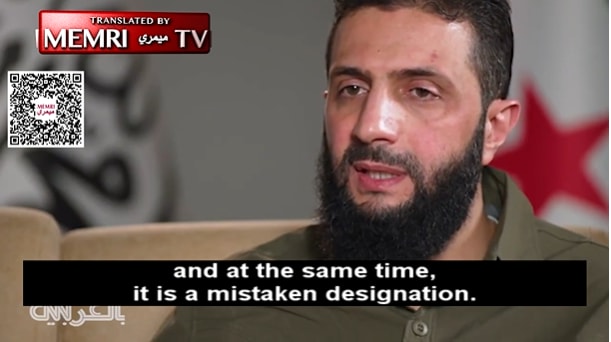
Interviewer: "The U.S. and other countries say that you were a part of an organization that did all those things. [Al-Qaeda] killed civilians, displaced people, and so on."
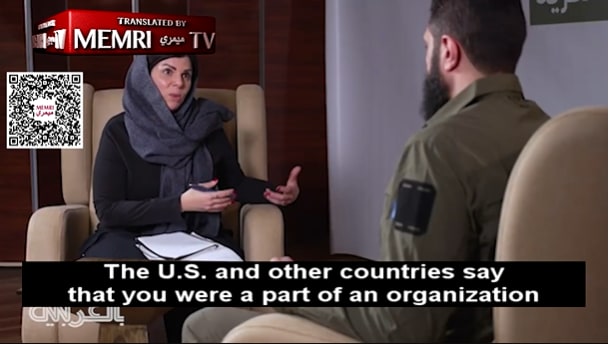
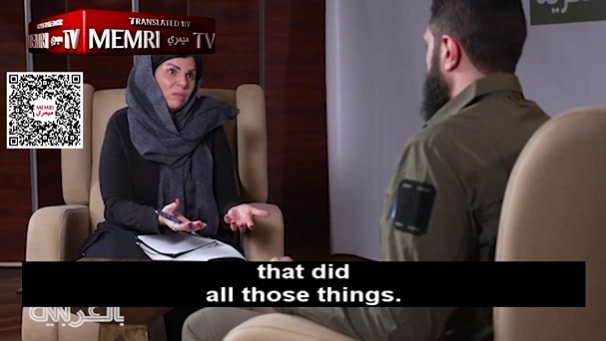
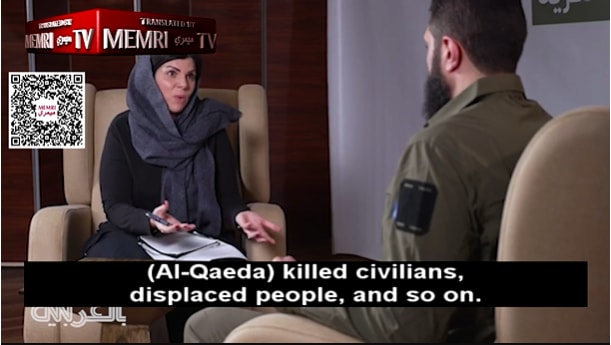
Al-Joulani: "Personally, I have never done those things.
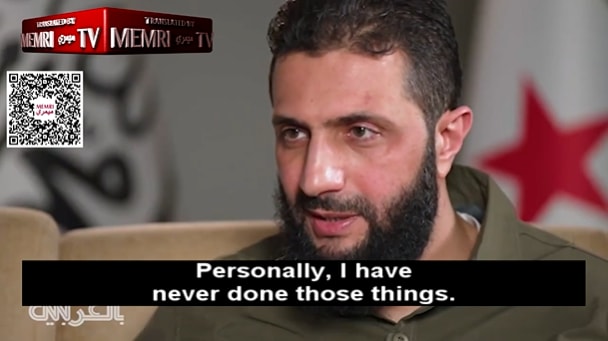
[...]
"I travelled to Iraq in order to fulfill the duty to defend the people there. When I returned to Syria, I did not want to bring what happened there to Syria. This is what caused the dispute we had with ISIS. I was completely against harming civilians, bombing people, targeting them indiscriminately, or just shooting in all directions."
[...]
Interviewer: "What is your position on the presence of U.S. forces in Syria – 900 soldiers and military bases."
Al-Joulani: "I believe that Syria has had enough of all that it has been through, and it needs to embark on an internal national dialogue, in isolation from all the foreign intervention. I believe that once this regime is ousted, the problem of its existence will be over, and there will be no need or justification for the presence of all these [foreign] forces, unless it serves the supreme interests of Syria, and is done as part of understandings, which have legal foundation, so that if there is a dispute, there will be a legal authority that can be approached. I believe that the presence of most [foreign] forces in Syria right now is inappropriate. There should be a legal framework to allow for this presence, or they should all leave because the reason for their presence no longer exists."
